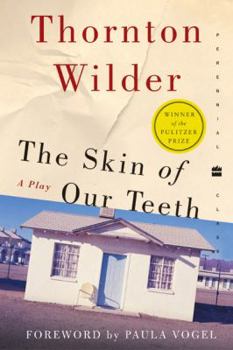The Skin of Our Teeth
Select Format
Select Condition 
Book Overview
Meet George and Maggie Antrobus of Excelsior, New Jersey, a suburban, commuter-town couple (married for 5,000 years), who bear more than a casual resemblance to that first husband and wife, Adam and... This description may be from another edition of this product.
Format:Paperback
Language:English
ISBN:0060088931
ISBN13:9780060088934
Release Date:April 2003
Publisher:Harper Perennial
Length:176 Pages
Weight:0.36 lbs.
Dimensions:0.5" x 5.3" x 8.0"
Customer Reviews
2 ratings
The Skin of Our Teeth
Published by Thriftbooks.com User , 14 years ago
I am highly pleased with this product, it arrived in time and in wonderful condition! Thanks so much!
"The end of this play isn't written yet."
Published by Thriftbooks.com User , 19 years ago
Ignoring the conventions of time, this playful "message play" follows one family from the days of the glaciers and dinosaurs to a post-apocalyptic, modern world. George Antrobus, the inventor of the wheel, and Maggie, his wife, the inventor of the apron, have two children, Gladys and Henry (whose previous name was Cain). The bossy father, domestic and subservient mother, aggressive and dangerous son, and innocent daughter interact, often humorously, onstage and are also seen through the viewpoint of Sabina, the flirtatious maid. As the play progresses through the eras, Wilder raises questions about civilization and values. George, by Act II, is convinced that the world is made for pleasure and power, but by the final act, after a world cataclysm, the family confronts what is truly important in their lives. A pet dinosaur and a wooly mammoth, the Boardwalk of New Jersey and the Miss America contest, the fraternal Order of Mammals (of which George is President), and the attempted seduction of George and his fellow Mammals by predatory women all add to the visual appeal of this production. Though the play pretends to be traditional in its dramatic structure, it takes liberties with the audience as the various actors step out of character to address the audience, as does the director. At one point Sabina refuses to play a scene, summarizing it for the audience as the director and George plead with her. First produced in 1942, the play reflects Wilder's fear that the war then engulfing the world might truly be a war for the future of civilization. His conclusion, which highlights the values of western philosophers, such as Spinoza, Aristotle, and Plato, also reflects his religious beliefs and his belief in the enduring values of (western) literature. "We've come a long way--we're learning," he says, hopefully, but he also reminds us that "the end of this play isn't written yet." Creative and original in its day, the play represents a major moment in American theater. Less innovative now, more than sixty years later, it still offers food for thought in its reminder of enduring values and its questions about what we value and would save from our own lives in a similar cataclysm. Mary Whipple




